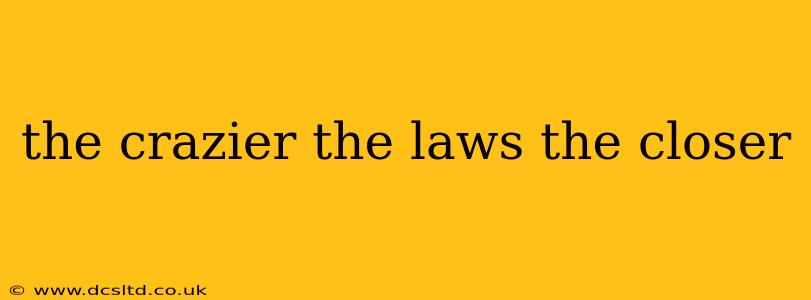The Crazier the Laws, the Closer to Anarchy? Exploring the Relationship Between Extreme Legislation and Social Order
The saying "the crazier the laws, the closer to anarchy" suggests a correlation between overly restrictive or illogical legislation and the breakdown of social order. While not a universally accepted truth, this statement highlights a valid concern about the potential consequences of extreme legal measures. This exploration will delve into the nuances of this assertion, examining the potential for excessive laws to backfire and examining the historical and contemporary examples that illustrate the complex interplay between law, society, and chaos.
What constitutes "crazy" laws?
Before examining the relationship between extreme laws and societal breakdown, it's crucial to define what constitutes "crazy" laws. This isn't simply a matter of personal opinion; instead, it involves laws that are:
-
Unenforceable: Laws so broad or impractical that they cannot be effectively implemented. Think of prohibition-era alcohol laws in the US – their unenforceability led to widespread disregard and the rise of organized crime.
-
Unjust: Laws that discriminate against specific groups or violate fundamental human rights. Historically, Jim Crow laws in the American South are prime examples of unjust legislation that fueled social unrest and ultimately contributed to the Civil Rights Movement.
-
Illogical or Contradictory: Laws that contain internal contradictions or are based on flawed logic. These can create confusion and undermine public trust in the legal system.
-
Overly Punitive: Laws with excessively harsh penalties that are disproportionate to the offense. This can lead to resentment and a sense of injustice within the population.
-
Based on fear, not reason: Laws implemented in response to panic or fear, without proper consideration of their long-term consequences. This can lead to the erosion of civil liberties and due process.
Do stricter laws always lead to less crime?
A common argument for stricter laws is their crime-deterrent effect. However, this is not always the case. Overly punitive laws can:
-
Drive crime underground: Stricter penalties can push criminal activity into hidden or more dangerous forms, making it harder to track and address.
-
Increase the power of criminal organizations: When legal avenues are restricted, individuals might turn to organized crime for survival or support. This leads to greater social instability.
-
Foster resentment and defiance: Unjust or overly harsh laws can lead to widespread defiance of the law, potentially escalating into open rebellion.
The effectiveness of laws hinges on their fairness, clarity, and ability to address root causes of crime, not just their severity.
Can extreme laws lead to societal collapse?
While a direct causal link between "crazy" laws and societal collapse is difficult to definitively prove, a pattern emerges. When laws become so extreme as to be widely disregarded or actively resisted, the legitimacy of the governing system erodes. This breakdown of trust is a cornerstone of social instability and can potentially contribute to civil unrest, revolution, or even state failure. Historical examples such as the French Revolution, fueled in part by resentment toward oppressive laws, illustrate the potential consequences.
What are some examples of laws that arguably contributed to societal instability?
Numerous historical and contemporary examples highlight the potential negative consequences of extreme legislation. The aforementioned prohibition and Jim Crow laws are compelling examples in the United States. Similarly, many repressive regimes have implemented sweeping laws that have stifled dissent and created widespread discontent, leading to various forms of social unrest. These instances underscore the importance of creating a legal framework that balances societal needs with individual freedoms and human rights.
How can governments avoid enacting "crazy" laws?
Effective governance requires careful consideration of the potential consequences of legislation. This involves:
-
Public consultation and engagement: Involving citizens in the legislative process can lead to more informed and equitable laws.
-
Independent judicial review: A robust and independent judicial system can provide checks and balances, preventing the enactment of overly harsh or unjust laws.
-
Evidence-based policymaking: Legislation should be informed by research and data, rather than driven by fear or political expediency.
-
Respect for human rights: Laws should uphold fundamental human rights and freedoms, ensuring fairness and justice.
The relationship between legislation and societal order is complex. While laws are necessary to maintain social cohesion, extreme or unjust laws can backfire, creating instability and undermining the very system they are intended to uphold. The key lies in crafting laws that are fair, just, enforceable, and reflect the needs and values of the society they govern.
